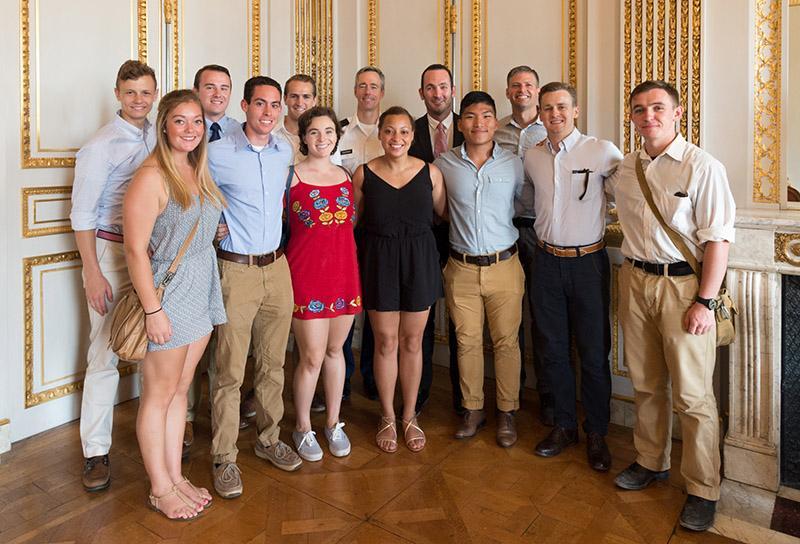‘Paris as the Classroom’

Cadets participating in French Language & Culture in Paris toured the George C. Marshall Center and heard presentations from U.S. Army Col. David Chapman and Brian Bauer of the U.S. State Department.––Photo courtesy of Maj. Abbey Carrico.
LEXINGTON, Va., Aug. 4, 2017—Living for five weeks just three blocks from the Eiffel Tower, buying food and fixing one’s own meals, plus visiting Normandy and Brittany – these were just a handful of the experiences that 10 cadets had this summer when they traveled to Paris as part of a VMI-sponsored summer study program, French Language & Culture in Paris.
Now in its third year, the program is open to all cadets studying French, regardless of major. Cadets earn a total of nine academic credits: three from French 252, France and the French, which is co-taught by Maj. Abbey Carrico and Maj. Jeff Kendrick, both assistant professor of modern languages and cultures; and six from an intensive program of language study through a French university, L’Institut Catholique de Paris.
“We hit the ground running,” explained Carrico, noting that much of French 252 is taught in the first 10 days after cadets arrive. Furthermore, it’s taught not in a classroom but on the streets of Paris and on excursions both inside and outside the city.
“There’s all this seeing and walking—Paris as the classroom,” said Carrico.
In addition to seeing the sights in Paris that any tourist would see, such as the Eiffel Tower and Notre Dame, participants in this year’s program had a special tour of the George C. Marshall Center, where the Marshall Plan that brought desperately needed aid to war-torn Europe after World War II was administered. The Marshall Center is inside the Talleyrand Hotel in Paris.
“With VMI, and George Marshall, and the cadets’ interest, we just thought that would be something unique for our cadets that isn’t necessarily a normal part of other schools’ overseas program,” Carrico commented.
To prepare for this visit, cadets were required to visit the website of the George C. Marshall Library, which is on the VMI post, and read about the Marshall Plan. Then, while at the Talleyrand cadets heard presentations from two Americans living and working in Paris to connect the World War II-era history lessons with the present day.
The first, Brian Bauer, works for the State Department as a cultural liaison, while the second, Col. David Chapman, is the U.S. Army’s attache, making him the Army’s highest-ranking official in France. Both men spoke to the cadets about what skills are necessary to hold positions such as theirs.
“Amazingly, there was a lot of overlap between the two,” said Kendrick.
“That’s one of the great things about the study abroad [program],” added Carrico. “They’re able to go and see—here’s other Americans who have made a career out of language learning and learning about different cultures.”
The cadets also visited Normandy and Brittany, as their predecessors in years past have done—but this year, they were joined by cadets participating in VMI’s summer engineering study-abroad program in Berlin, Germany.
“The Berlin cadets got to see a whole other country, and the Paris cadets got to see life outside of Paris,” Kendrick said. Next year, he and Carrico noted, the Paris cadets may travel to Berlin.
Once the first 10 days of the program are done, cadets immerse themselves in language study. Students from all over the world travel to attend French classes at L’Institut Catholique de Paris, Carrico and Kendrick explained, from nations as far-flung as China, Australia, Italy, and Brazil.
“The only common language is French,” Kendrick stated.
For Annika Tice ’19, that was part of the attraction. She’d been studying French since high school, and had reached the 400 level at VMI, yet felt that she’d reached a plateau in her language development, particularly where speaking was concerned.
“When you’re doing language classes in college, you don’t have time to practice all of those skills, so you focus on grammar and writing skills rather than conversation,” said Tice.
“My conversation has gotten better [as a result of the trip], and also my comprehension,” she continued. “I can sit down and watch a French film now.”
Over the course of the five weeks, Tice found that her language skills had grown in an even deeper way as well.
“A lot of people think that when you learn a foreign language, you’re supposed to translate it directly back into your own language, but it’s when you start to get to know the language and hear and understand it—that’s where I think I grew a lot by being there,” she said. “Plus you’re around French 24/7.”
While in Paris, Tice and the other cadets lived in Parisian apartments with French citizens as their neighbors, shopped for their own food, and prepared their own meals. At the grocery store, Tice and her roommates tried to evade the language barrier by using the self-checkout, but that turned into a comedy of errors when they couldn’t understand the French that the mechanical voice was speaking.
“I think the cashier came over about five times,” she recalled. “We decided that face-to-face interaction was actually better, so we stuck with that from then on.”
Such experiences provide rich fodder for a required assignment in French 252, the class Carrico and Kendrick teach. The assignment is for the cadets to write blog posts on what they’ve learned over the course of the program.
“It’s such a great experience to see them grow over the five weeks,” said Kendrick. “It’s up to them to show us intellectual growth. How they define that is kind of up to them. What that looks like is different for each and every cadet. We’ve never had anyone not be able to do that.”
For the professors, reading their students’ reflections is a reward in its own right. “It’s always really refreshing [to see Paris through the cadets’ eyes],” said Carrico.
- Mary Price
-VMI-
.svg)
.png)